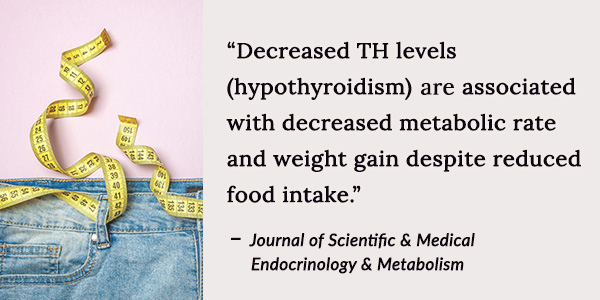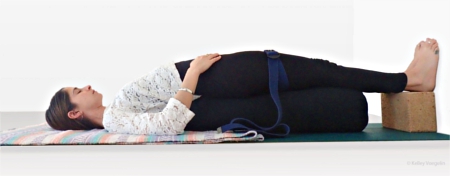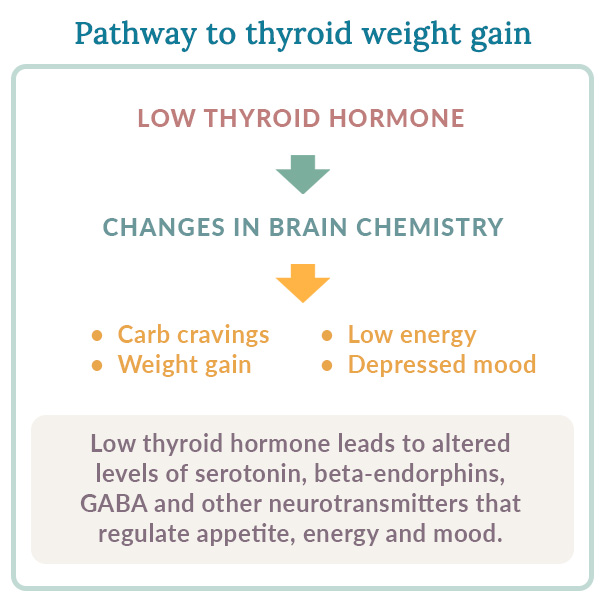Authored by Dr. Sarika Arora, MD
Unexpected weight gain and difficulty losing weight are often the first noticeable signs that you’re struggling with hypothyroidism (low thyroid). Among its many functions, your thyroid is responsible for your body’s metabolism, including its ability to burn fat and calories for energy. When women have hypothyroidism, the thyroid does not produce and/or release enough thyroid hormones to support optimal metabolism. This can result in a sluggish metabolic rate in which unused caloric “fuel” is stored as fat.

Losing weight with hypothyroidism starts with choosing the right foods to nourish your thyroid and engaging in lifestyle habits that help restore thyroid health. The central goal is bringing your metabolism back up to speed, but taking good care of your thyroid helps you find relief from other symptoms of low thyroid that could be contributing to your weight gain, like depression, fatigue and food cravings.
Women will often come to us saying, “I have hypothyroidism and can’t lose weight!” Here’s what we share about what to eat, foods to avoid and other healthy whole body tips that will help you restore your thyroid and return to a healthy weight.
1. Diet for hypothyroidism
Whether you’re trying to lose a few or 20-plus pounds, the best diet for hypothyroidism weight loss is one that provides your thyroid gland with the nourishment it needs to bring balance back to your thyroid hormones.
After over two decades of helping thousands of women with their low thyroid symptoms, here are the steps that we’ve seen work again and again to finally stop thyroid weight gain:
- Choose whole foods for optimal nutrition. Iodine and selenium are the most important thyroid supporters, but you also need zinc, iron and Vitamin C. For iodine-rich foods, reach for foods like shrimp, haddock, salmon, sea vegetables, eggs and mushrooms. Brazil nuts are a great source for selenium. For more food lists, see our article: “What to eat to support your thyroid.”
- Eat your meals and snacks at regular times, and be sure to eat breakfast within an hour of waking. Missing meals or snacks can stress your thyroid.
- Include protein at every meal, as well as fiber for breakfast and lunch. Remember that good sources of fiber include fruits and vegetables, not just grains.
- Completely eliminate gluten, sugar/sweeteners, alcohol and junk food. These ingredients can interfere with healthy thyroid function.
- Learn which foods contain thyroid-suppressing compounds known as goitrogens — including cruciferous vegetables such as cabbage, broccoli and cauliflower. Always steam or cook these vegetables to reduce or eliminate the goitrogens.
- Hypothyroidism slows digestive function, so it’s important to eat smaller, more frequent meals with balanced macronutrients, including quality proteins, complex carbs and healthy fats. Increase your fiber intake to help move foods through the digestive tract.
- Need recipe ideas for how to make a diet for thyroid weight loss work? Try this thyroid-friendly salad or make some delicious thyroid-boosting gluten free cookies!

2. Exercise and well-being
Exercise is important for weight loss, but it’s also a key part of naturally supporting improved thyroid function. There’s just one problem: hypothyroidism can sometimes lead to a vicious cycle where exercise seems next to impossible. Besides weight gain, low thyroid can also trigger fatigue and achy joints, two symptoms that make exercise a chore. As any woman with hypothyroidism knows, you may experience times when you feel that you don’t have enough energy to even move. Yet when you don’t exercise, it just makes all your hypothyroid symptoms worse.
How can you break the cycle? Here are some research-backed exercise strategies and lifestyle tips to help get you moving. Check with your healthcare provider before starting any new exercise regimen.
Make exercise a regular part of your life
Studies show that thyroid hormones can increase when your heart rate rises with exercise. Regular physical activity reminds your thyroid to stay alert because it has work to do while you’re moving. Try low impact exercises like walking and swimming.
Beginner’s tip: Set a time each day to take a walk. Gradually build up to walking about 30 minutes, five times a week. When you first get started, even a 10-minute walk counts! Build up from there and aim for a brisk pace.
Help yourself relax whenever you can
Your stress response can directly influence your thyroid function because the stress hormone cortisol can inhibit pivotal thyroid hormones, TSH (thyroid stimulating hormone) and T4 (thyroxine). To help with stress:
- Find opportunities to cultivate little moments of calmness throughout your day.
- Try alternate nostril breathing, meditation and strategic napping to help reduce stress hormone levels.
- Getting a little more quality sleep at night can counter stress that occurs during the day.
- Exercise at a moderate pace to prevent the spike in stress hormones that can come with overexertion/overly intense exercise.
Yoga offers special benefits for low thyroid
Yoga is a form of exercise that provides both physical activity and deep forms of stress relief. Certain yoga poses directly support improved thyroid function by increasing oxygen flow to this important gland. One of these poses is “supported bridge pose”(Setu Bandha Sarvangasana). Here’s how to do it:

- Lie on a bolster (or a few blankets folded into that shape) with your head and shoulders on one side and your legs on the other. Gradually slide your head and shoulders to the floor. Extend your legs and place your heels on a block or a folded blanket, with the soles of your feet against a wall if possible. (Before you lie back, try wrapping a belt or strap around your upper thighs to keep your legs from splaying out.)
- Relax your arms out to the sides, in a cactus shape or place your hands on your belly. Relax the back of your neck, with your throat compressed gently.
- Breathe in and out softly. Stay for 5-10 minutes and come out by carefully rolling off the bolster to one side.
Upon release from the posture, fresh blood passes through the throat tissues, bringing in nutrients and oxygen, while removing toxins and stagnation. This exchange cleanses and stimulates the thyroid. Learn more simple thyroid-friendly yoga techniques in our blog: 3 yoga techniques for thyroid health.
3. Supplements and vitamins
Hypothyroidism is often a sign that you are deficient in certain key compounds your thyroid needs for healthy function. Thanks to ample research in this area, we know which vitamins, minerals and other natural supplements help the thyroid return to a balanced state. In addition to eating healthy thyroid-friendly foods, consider supplementation for added thyroid support.
Vitamins, minerals and micronutrients for low thyroid
- Selenium – is pivotal for thyroid function, helping to protect the thyroid from oxidative stress and serving as a critical part of thyroid hormone production. Deficiency in the mineral can directly contribute to thyroid dysfunction.
- Iodine – the only known role of iodine in the body is to support thyroid hormone production. Both thyroid hormones – triiodothyronine (T3) and thyroxine (T4) – contain iodine. Iodine deficiency is a known cause of thyroid disorders like hypothyroidism.
- Zinc – the mineral zinc is required for thyroid hormone production and maintaining healthy levels of T3, T4 and TSH.
- Iron – is a mineral needed by the thyroid to convert T4 into T3, the active form of thyroid hormone. Iron deficiency (anemia) is associated with thyroid dysfunction.
- Vitamin C – antioxidant Vitamin C helps with absorption and utilization of thyroid hormones.
- Sage — this herb has anti-inflammatory and antioxidant effects that promote better hormone receptor function and support improved mood, memory and healthy blood sugar balance.
- Ashwagandha — an ayurvedic herb widely used for its anti-stress and calming properties, it supports production of thyroid hormones and helps correct imbalances in the nervous, endocrine and immune systems.
- Coleus forskohlii — a phytochemical in this extract mimics the effect of thyroid-stimulating hormone to enhance iodine uptake and thyroid hormone production. Studies show it has supportive effects on the immune system, body weight and mood regulation.
- T-Balance Plus – our multi mineral and micronutrient formula offers pharmaceutical grade natural thyroid support for restored thyroid health and relief from low thyroid symptoms.
4. Can hypothyroidism medication cause weight gain?
Are you taking prescription thyroid medication and still gaining weight? In some cases, a common side effect of medication for low thyroid, including Synthroid, is an increase to your appetite, which may result in overeating (and weight gain). More often than not, gaining weight while taking a thyroid medication is a sign that you are not taking the correct dosage and low thyroid is persisting. Check in with your body: are you still experiencing cold sensitivity, fatigue, brittle hair and other classic symptoms of hypothyroidism? Get back in touch with your prescribing health care provider to see if you need further testing or an adjustment to your medication.
Why is it so hard to lose weight with hypothyroidism?
Your metabolism slows when you have hypothyroidism. But that’s not the only change happening in your body that can affect your weight. Chemical messengers that regulate our eating behavior become mixed up when thyroid hormones are imbalanced. When thyroid hormones are low — even just a little — the parts of your brain which control appetite can be significantly affected.
Changes in brain chemistry may include:
- Serotonin decrease.
- Beta endorphin decrease.
- GABA (gamma-aminobutyric acid) decrease.
- Leptin becomes inefficient.
Serotonin, beta endorphin and GABA are brain chemicals connected to food cravings as well as feeling satisfied after we eat. And leptin is a critically important hormone because it tells the body when to lose weight and when to keep it. When these brain chemicals are disrupted, the result can be intense carbohydrate cravings, low energy, depressed moods, changes in body shape – and stubborn weight gain.

While all this can make it seem like it’s impossible to lose weight with hypothyroidism, it’s not. The solution to all these problems is relatively simple. By supporting your thyroid, you can break through your thyroid-related weight loss resistance and finally let go of the excess pounds.
Conclusion
Giving your body thyroid-supportive nutrients and making dietary changes and lifestyle modifications when you have hypothyroidism can initiate amazing changes in your body, and how you look and feel. The key to thyroid weight loss is to swim upstream and fix your thyroid first! Once your thyroid health is restored, your body can breathe a sigh of relief and drop those extra pounds for good.










